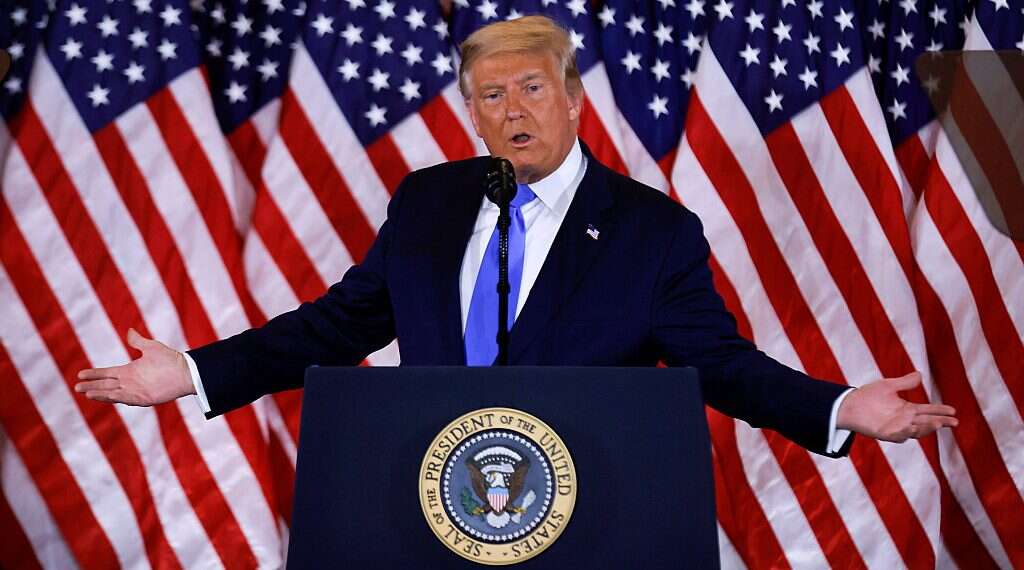by Prof. Abraham Ben-Zvi
Although Joe Biden's chances of winning the election are better than those of the man now sitting in the Oval Office, we must not be blinded by general voter turnout. What matters most, and will only be made clear once voting comes to an end, is voter segmentation.

US President Donald Trump speaks about early results from the 2020 presidential election in the East Room of the White House, Nov. 4, 2020 | Photo: Reuters/Carlos Barria
One of the more common tendencies in evaluating voters' conduct at the ballot box is to make much of macro data such as exceptional voter turnout.
Indeed, when the American people demonstrate such high levels of political participation, the automatic conclusion is that this will benefit the Democratic party. Its members and supporters have in fact come out for that party's presidential candidate Joe Biden en masse, and more so than voters have cast their ballots US President Donald Trump in early voting.
And yet, although the challenger's chances are better than those of the man now sitting in the Oval Office, we must not be blinded by the general voting rates, even if they break the mythological record of the 1960 campaign, which saw Democratic Senator John F. Kennedy defeat incumbent Republican Vice President Richard Nixon.
What is of even greater strategic importance, and will only be made clear once there is a cessation of fighting and voting comes to an end, is voter segmentation.
So, for example, the polls indicate widespread support for Biden among voters under 29 years of age. However, in 2016, this demographic did not turn out enough to make much of a mark on Election Day, and it remains unclear whether they will come out in greater numbers this time around.
The same is also true of the African American community, and in particular those members 45 and older, who overwhelmingly support Biden. Yet here too, the high turnout in early voting does not provide any indication of the African American slice of the voter pie.
It was just four years ago that this community actively helped the Trump campaign with its relatively low voter turnout, which was significantly lower than when the African American demographic came out in droves for Democrat Barack Obama in both 2008 and 2012.
Violence is nothing new
The second reason we should be wary of reading too much into what at first glance appears to be an unprecedented phenomenon is the widespread violence that is seemingly on the verge of breaking out. While we should not dismiss the severity of the polarization and the radical rhetoric prevalent in this generation, and in particular the Trump era, neither of these factors necessarily herald the impending end of democracy in America.
The opposite is true – at least up until now. The contrarian rhetoric and attempts to sow doubt in the legitimacy of the process have yet to cause actual harm to the mechanisms of American civil society or its institutions.
By contrast, 1968 was a year saturated with not only verbal but physical violence, including the murder of then-Democratic presidential candidate Robert F. Kennedy at the hands of Sirhan Sirhan in Los Angeles.
The Democratic National Convention, which convened in Chicago that summer to select a candidate to run against the incumbent Richard Nixon in a polarized and combative atmosphere, was characterized by widespread violence on the streets of Chicago. There, police officers and forces loyal to the city's then-Mayor Richard J. Daley beat protesters who demanded an immediate withdrawal from Vietnam and an end to the war.
In this light, the determination that the Trump era has drawn the curtain on the age of pragmatism and moderation in American political culture is a hasty one. The 45th president has certainly contributed to the exacerbation of rivalries, but it was the Vietnam War and the rift that it caused that presented the principle if not first factor in the trajectory of decline in the era of relative consensus in American politics.
Nevertheless, the fact that while in office, Trump has continued to adhere to his initial beliefs and avoided trying to sway other audiences has contributed not only to polarization in the political discourse, but could come back to bite him. His desire to make good on all of his campaign promises to his base, and the Evangelical community in particular, has created antagonism among other groups, and white suburban college-educated women in particular, who are concerned sensitive issues such as a women's right to choose and matters concerning religion and state will be opened up for deliberation.
Very soon, possibly by tomorrow, the picture will be made clear, and we will finally learn whether Trump has paid a heavy electoral price for his absolute loyalty to his followers. All that remains is to wait and see.
Prof. Abraham Ben-Zvi
Source: https://www.israelhayom.com/2020/11/04/trump-did-not-divide-america/
Follow Middle East and Terrorism on Twitter
No comments:
Post a Comment